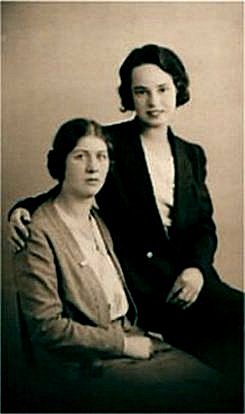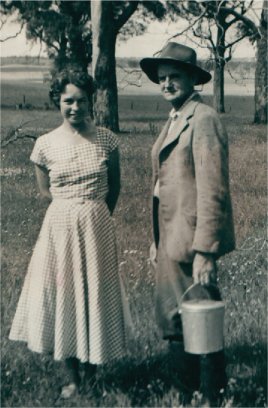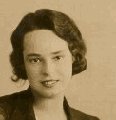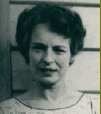She was
born Jane Ramsey Forster in 1912 and grew up in Scotland and graduated
as a Master of Arts from Edinburgh University to then teach languages.
She married Robert Atkinson Hawking and lived in Yorkshire, where they
had a large piggery which sold bacon to factories throughout England.
Swine Fever bankrupted the family and Jean chose to immigrate and make
a new start for her family. At this time Jean was 40 and Robert was 50
years old. While Robert took a long time to adjust to the new environment
and their social circumstances, both Jean and the children reveled in
the freedom, the warmth, the space and the fierce colours and landscapes
of this new land.
Their adventures
in Australia took them from Sydney, the heart of the land, to far northern
tropical towns, from sheep stations in the western plains to dairy farms
on the coastal strip. Jean worked as a cleaner, a gardener, a carer, an
orphanage matron and finally back as a language teacher with a focus on
excellence. Robert worked as a share farmer but, used to the English ways
of farming, found the different ways of land management difficult to adapt
to. In North Queensland, Robert worked in one of the big sugar mills and
on the weekends both he and Jean tin mined. This became the common ground
both loved. Together they retired to the mine just north of Cairns and
while they had no power, they enjoyed both the sluicing out of the tin
and the garden in which it was possible to grow crops all year round if
water could be kept up to them. Robert devised a method of pumping water
from the sea to wash the earth through a series of sluices, thus extracting
the tin. I think it was here that Robert, too, learned to love this land
of promise and both died content to remain always in the land they both
loved.
Jean left
a legacy which shouts of the 'Power of Woman'. The sheer power that can
make new circumstances and environments work for them. This happens because
they allow the land to mould and change them, not try to make the land
change. The mobility of the family was determined, not only by Robert's
need for new job opportunities, but the 'gypsy' in Jean's soul. The family
traveled with an old Chevrolet van and trailer, camping along the route.
Her sheer organizational ability to pack so that only things needed on
route would be unpacked each night, demonstrated a clear mind and focus.
In each town they soon enjoyed a circle of friends and respect of others.
Robert
too left a legacy, a legacy which gently tells of respect for all living
things. Of giving to both animals and people so they might give to you.
Many hard
times were endured. For example, six months after arriving in Australia,
the home they rented with all the possessions was burnt to the ground.
Yet they did not despair, they accepted the gifts of others to start again.
These gifts they returned many fold, maybe not to the same people but
to others along their life's path. Jean lived her life always by the philosophy
of "wearing out - not rusting out" and she lived life to the fullest.
The greatest
gifts I received from both my parents was the fine behaviour they modelled
to me. The land on which they mined tin has now been declared Indigenous
People's land. A plague to my parents remains in the settlement recognising
their contribution to pioneering in the area. Both Jean and Robert Hawking,
following consent of the local indigenous people, remain enjoying the
peace, tranquility and beauty of Hartley's Creek in North Queensland for
perpetuity.





